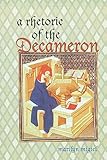A Rhetoric of the Decameron / Marilyn Migiel.
Material type: TextSeries: Toronto Italian StudiesPublisher: Toronto : University of Toronto Press, [2003]Copyright date: ©2003Description: 1 online resource (220 p.)Content type:
TextSeries: Toronto Italian StudiesPublisher: Toronto : University of Toronto Press, [2003]Copyright date: ©2003Description: 1 online resource (220 p.)Content type: - 9780802085948
- 9781442670457
- 853/.1
- PQ4287 .M54 2003eb
- online - DeGruyter
| Item type | Current library | Call number | URL | Status | Notes | Barcode | |
|---|---|---|---|---|---|---|---|
 eBook
eBook
|
Biblioteca "Angelicum" Pont. Univ. S.Tommaso d'Aquino Nuvola online | online - DeGruyter (Browse shelf(Opens below)) | Online access | Not for loan (Accesso limitato) | Accesso per gli utenti autorizzati / Access for authorized users | (dgr)9781442670457 |
restricted access online access with authorization star
http://purl.org/coar/access_right/c_16ec
Both a passionate denunciation of masculinist readings of the Decameron and a meticulous critique of previous feminist analyses, Marilyn Migiel's A Rhetoric of the Decameron offers a sophisticated re-examination of the representations of women, men, gender identity, sexuality, love, hate, morality, and truth in Boccaccio's masterpiece. The Decameron stages an ongoing, dynamic, and spirited debate about issues as urgent now as in the fourteenth century ? a debate that can only be understood if the Decameron's rhetorical objectives and strategies are completely reconceived.Addressing herself equally to those who argue for a proto-feminist Boccaccio ? a quasi-liberal champion of women's autonomy ? and to those who argue for a positivistically secure historical Boccaccio who could not possibly anticipate the concerns of the twenty-first century, Migiel challenges readers to pay attention to Boccaccio's language, to his pronouns, his passives, his echolalia, his patterns of repetition, and his figurative language. She argues that human experience, particularly in the sexual realm, is articulated differently by the Decameron's male and female narrators, and refutes the notion that the Decameron offers an undifferentiated celebration of Eros. Ultimately, Migiel contends, the stories of the Decameron suggest that as women become more empowered, the limitations on them, including the threat of violence, become more insistent.
Mode of access: Internet via World Wide Web.
In English.
Description based on online resource; title from PDF title page (publisher's Web site, viewed 01. Nov 2023)


